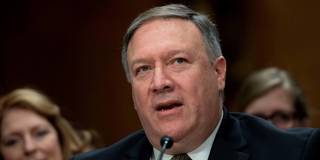Following revelations that CIA Director Mike Pompeo traveled secretly to Pyongyang to lay the groundwork for the planned summit between President Donald Trump and North Korean leader Kim Jong-un, some congressional leaders cried foul. But secret diplomacy has long been one of the most effective tools in the US foreign-policy kit.
CAMBRIDGE – When New Jersey Senator Robert Menendez announced that he will oppose Mike Pompeo’s nomination to US Secretary of State, he explained that he would do so because Pompeo, currently Director of the CIA, had failed to disclose that he had traveled to North Korea over Easter weekend as President Donald Trump’s envoy.
For Menendez, the audacity and secrecy of the Trump administration’s preparations for a planned summit between Trump and North Korean leader Kim Jong-un was unacceptable. “Now I don’t expect diplomacy to be negotiated out in the open,” Menendez said in a recent speech, “but I do expect for someone who is the nominee to be Secretary of State, when he speaks with committee leadership and is asked specific questions about North Korea, to share some insights about such a visit. I believe our nation’s top diplomat must be forthright.”
The US constitution assigns senators the responsibility to confirm, by majority vote, the president’s cabinet nominees. America’s founders sought to ensure that individuals serving in high positions of public trust would be well qualified, not just in the judgment of a single individual, but after thoughtful review by an independently elected Senate.

CAMBRIDGE – When New Jersey Senator Robert Menendez announced that he will oppose Mike Pompeo’s nomination to US Secretary of State, he explained that he would do so because Pompeo, currently Director of the CIA, had failed to disclose that he had traveled to North Korea over Easter weekend as President Donald Trump’s envoy.
For Menendez, the audacity and secrecy of the Trump administration’s preparations for a planned summit between Trump and North Korean leader Kim Jong-un was unacceptable. “Now I don’t expect diplomacy to be negotiated out in the open,” Menendez said in a recent speech, “but I do expect for someone who is the nominee to be Secretary of State, when he speaks with committee leadership and is asked specific questions about North Korea, to share some insights about such a visit. I believe our nation’s top diplomat must be forthright.”
The US constitution assigns senators the responsibility to confirm, by majority vote, the president’s cabinet nominees. America’s founders sought to ensure that individuals serving in high positions of public trust would be well qualified, not just in the judgment of a single individual, but after thoughtful review by an independently elected Senate.